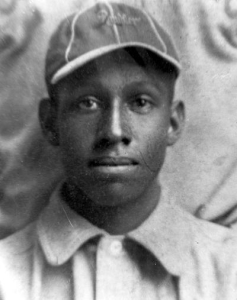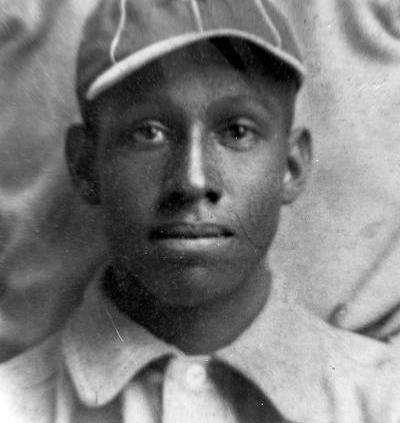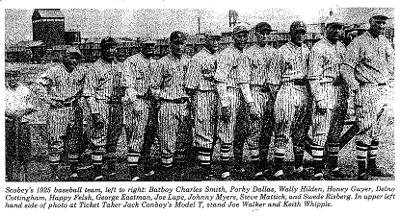June 14, 1925: ‘Outlaw’ Swede Risberg defeats John Donaldson in Montana duel
The towns of Scobey and Plentywood, 40 miles apart in northeast Montana, have a colorful past. This remote region has been a haven for outlaws, including horse and cattle rustlers, and, during Prohibition, bootleggers.
In 1925 Berry Stephens was the “bootlegger king” of Scobey.1 Local law enforcement ignored his illegal operations there, including his “old time wide-open saloon and gambling den.”2
Stephens controlled the Scobey baseball team and arranged baseball games that attracted visitors who would spend money at his “resort.”3 And he hired to play on his team Charles “Swede” Risberg and Oscar “Happy” Felsch, two of the “Black Sox” infamously banned from what was then known as Organized Baseball for throwing the 1919 World Series.4 The Scobey lifestyle, described by one newspaper as a “wild orgy of outlawry,”5 appealed to the pair. They were heavy drinkers but “always able to sober up for the games.”6
After their banishment from Organized Baseball, Risberg and Felsch continued their careers by playing for teams operating outside its governance. Such teams and players were considered “outlaws.”
Risberg had used his strong right arm to throw out baserunners when he was a shortstop in the major leagues. Now, he used it to pitch. According to research by Risberg biographer Alan Muchlinski, Risberg pitched 307 innings in 1924 for a Rochester, Minnesota, team, compiled a 23-8 record (with two ties), and struck out 266 batters.7
On May 17, 1925, the 30-year-old Risberg threw a shutout in Scobey’s 17-0 rout at Wolf Point, Montana.8 Ten days later, he pitched in another road victory, Scobey’s 11-4 pasting of Plentywood.9 And on June 3, he won again at Plentywood, 6-3.10
Scobey and Plentywood “battled about everything from politics to sports, and there were no holds barred,” recalled Scobey resident Keith Whipple. Their newspapers “hurled insults and editorials at each other that were about hot enough to scorch the pages.”11
 If Plentywood was going to beat its archrival in baseball, it needed a pitcher who could compete with Risberg. Enter 34-year-old John Donaldson, a tall, lanky Black southpaw who had pitched professionally with great success for 14 years. Currently a member of a Bertha, Minnesota, team, he traveled 600 miles to pitch for Plentywood against Scobey.
If Plentywood was going to beat its archrival in baseball, it needed a pitcher who could compete with Risberg. Enter 34-year-old John Donaldson, a tall, lanky Black southpaw who had pitched professionally with great success for 14 years. Currently a member of a Bertha, Minnesota, team, he traveled 600 miles to pitch for Plentywood against Scobey.
Donaldson previously pitched for J.L. Wilkinson’s barnstorming All-Nations team, beginning in 1912, and for Wilkinson’s Kansas City Monarchs in the Negro National League from 1920 to 1923. In 1924 he led Bertha, a White team, to the semipro championship of Minnesota.12
He faced an experienced Scobey squad. All of the Scobey players were salaried professionals, and most had played in the minor leagues, including second baseman Leo Seiffert and catcher Bob Marshall.
The Plentywood team was far less accomplished. But Plentywood had Donaldson. And he brought with him a catcher named Moore, because an ordinary receiver could not hold his blazing fastball.13 With this battery, could Plentywood defeat Scobey?
On Sunday, June 14, 1925, “the largest crowd ever gathered together at the Herald Ball Park in Plentywood” came to find out.14 Risberg estimated that 6,000 fans were present.15 Many traveled long distances to see the contest. The combined population of Scobey and Plentywood was less than 3,000.
The game began with Al “Porky” Dallas drawing a walk from Donaldson, but he was immediately erased; Seiffert popped to Donaldson and Dallas was doubled off first. Risberg, batting third in the lineup, singled to right field, but Donaldson struck out Felsch, the cleanup hitter.
Plentywood scored a run in the second inning. Hub Wirtzberger singled with one out and came home after a sacrifice by Mattuck and a single by O’Donnell.
Scobey evened the score in the top of the fourth. Risberg singled, stole second base, and moved to third on Felsch’s single to right center. Felsch got caught in a rundown between first and second, and while that was happening, “Risberg took advantage of the see-saw play and slipped home.”16
Donaldson, the Plentywood cleanup hitter, led off the bottom of the fourth with a bunt single and stole second and third, but he was stranded. Risberg retired the next 15 batters in a row, fanning seven of them. Meanwhile, Donaldson dominated the Scobey hitters. It was quite a duel.
Facing Risberg in the bottom of the ninth with the score tied, Plentywood loaded the bases: Gullickson led off with a single; Molle fouled out; Donaldson singled; and Moore was hit by a pitch. It looked as though Plentywood would finally defeat its nemesis. But Wirtzberger lined to second baseman Seiffert, who doubled Moore off first to end the threat.
Scobey broke the tie in the top of the 10th. George Eastman led off with a single to right field. Johnny Meyers grounded to Donaldson, who got the force out at second, and Meyers scored on Wally Hilden’s single to right. Dallas drew a walk, and after Seiffert went out, Risberg’s single drove in Hilden and Dallas.
Mattuck led off the bottom of the 10th with an infield hit. But Risberg struck out the next three batters to close out the game. The final score was Scobey 4, Plentywood 1.
Donaldson fanned 12 batters in the thrilling 10-inning contest. He allowed nine hits, including three by Risberg and two by Felsch. Risberg struck out 14 and allowed six hits, including two by Donaldson.
Epilogue
After the game, Donaldson went back to the Bertha team in Minnesota, but he returned to Montana in July to pitch in two more games for Plentywood against Risberg and Scobey. In the first, on July 14 at Plentywood, Scobey won 8-2.17 In the second, on July 17 at Scobey, Plentywood prevailed 10-7.18
Scobey’s won-lost record for the 1925 season was 51-8.19
In October 1925, Berry Stephens was jailed by federal authorities and his “notorious joint” in Scobey was shut down.20
Felsch returned to the Scobey team in 1926, but Risberg moved on. He began the season with Rochester, Minnesota, and went to Watertown, South Dakota, in July. At Watertown on September 26, 1926, he and Donaldson competed in another classic duel. Risberg and Watertown edged Donaldson and Lismore, Minnesota, 1-0.21
According to Muchlinski, Risberg and Donaldson “played against each other in 20 documented baseball games between 1923 and 1932, and both players were on the winning side in 10 of the 20 games.”22
Acknowledgments
This article was fact-checked by Russ Walsh and copy-edited by Len Levin. The author thanks Jacob Pomrenke for his input.
Sources
Game coverage in the June 19, 1925, issue of the Plentywood Producers News.
Gorton, Peter, and Sam Sinke. “The John Donaldson Network Research Website.” johndonaldson.bravehost.com, accessed January 2023.
Muchlinski, Alan. After the Black Sox: The Swede Risberg Story (Bloomington, Indiana: AuthorHouse, 2005).
Notes
1 “‘Bucket of Blood’ Scares Settlers from Daniels County,” Plentywood (Montana) Producers News, August 28, 1925: 8.
2 “Court Clamps Lid on ‘Bucket-of-Blood,’” Plentywood Producers News, October 9, 1925: 1.
3 “Court Clamps Lid on ‘Bucket-of-Blood.’”
4 “Producers News Enters Ninth Year in Prosperous Condition,” Plentywood Producers News, April 30, 1926: 1, 8.
5 “Booze Flows in the Streets of Scobey,” Plentywood Producers News, May 29, 1925: 1.
6 Alan Muchlinski, After the Black Sox: The Swede Risberg Story (Bloomington, Indiana: AuthorHouse, 2005), 34.
7 Muchlinski, 28.
8 “First Home Game Goes to Visitors,” Wolf Point (Montana) Herald, May 21, 1925: 1.
9 “Scobey Wins First Game from P’wood,” Plentywood Producers News, May 29, 1925: 1.
10 “Scobey Takes Another from Local Players,” Plentywood Producers News, June 5, 1925: 2.
11 Keith Whipple (as told to Dorothy Rustebakke), “Scobey’s Rip-Roaring Baseball Team of the Twenties,” The Montana Journal, September-October 1989: 21.
12 Peter W. Gorton, “John Wesley Donaldson, a Great Mound Artist,” in Steven R. Hoffbeck, ed., Swinging for the Fences: Black Baseball in Minnesota (St. Paul, Minnesota: Minnesota Historical Society Press, 2005), 84-107.
13 “Donaldson and Risberg Meet in Pitchers’ Battle,” Plentywood Producers News, June 12, 1925: 4.
14 “Scobey Wins after Losing Fast Game,” Plentywood Producers News, June 19, 1925: 4.
15 Muchlinski, 37.
16 “Scobey Wins after Losing Fast Game.”
17 “Scobey Wins by Large Score,” Plentywood Producers News, July 17, 1925: 8.
18 “Plentywood Cleans Up on Scobey,” Plentywood Producers News, July 24, 1925: 4.
19 Muchlinski, 37.
20 “‘Bucket of Blood’ Scares Settlers from Daniels County”; “Court Clamps Lid on ‘Bucket-of-Blood.’”
21 Muchlinski, 43-50.
22 Muchlinski, 7.
Additional Stats
Scobey 4
Plentywood 1
10 innings
Herald Ball Park
Plentywood, MT
Corrections? Additions?
If you can help us improve this game story, contact us.



